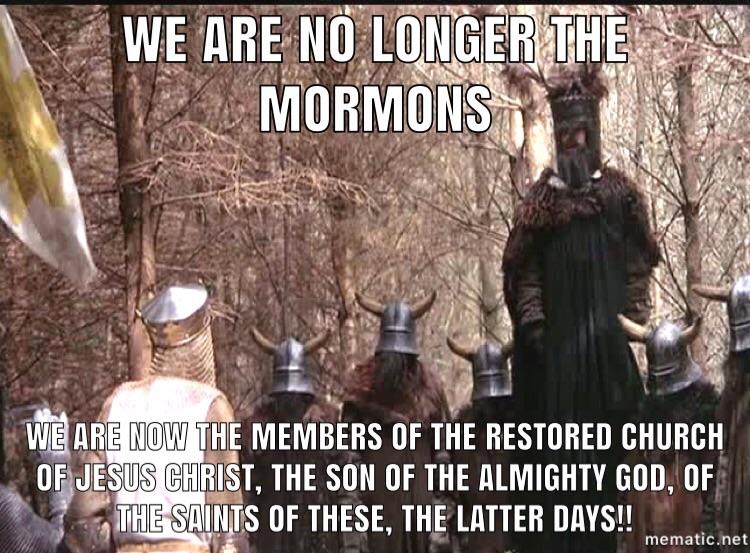Because internet outrage has an attention span of approximately 3.14159 seconds, and there were some submission and response delays, this story is no longer being discussed. However, since the Church of Jesus Christ of Latter-day Saints will probably forever be accused of being anti-woman, we’re still going to publish it here at DR.
This was originally written about 2 weeks ago, in the full swing of the Latter-day Saint Woman Social Media Blackout, when George Takei finally shocked his fans with information about this LDS scheme to control women. When it got to this point, I couldn’t help but respond.
I hope whether you participated or not, and whether you liked the idea or not, that you can get something out of this…
On October 6 of this year, The Church of Jesus Christ of Latter-day Saints had a historic meeting of the women of the Church. Twice a year, in April and October, regular Church services are suspended and 8 hours (yes 8!) of services are broadcast across the world from Salt Lake City in what is known as general conference. The 8 hours are done in 2 hour increments over Saturday and Sunday.
Prior to this October’s general conference, an extra Saturday evening session was held for the men of the Church (the general priesthood session), while women met a week before on Saturday evening (the general women’s session). However, this was the first meeting for women held during general conference weekend, as the men’s session and women’s session will alternate during the April and October sessions. Not the most exciting change (depending on your prospective), but a change nonetheless.
The women’s session is for all females ages 8 and up, and the men’s is for all males ages 8 and up. During this fall’s women’s session, President Nelson, the president and prophet of the Church, made four invitations for the women of the Church: 1. a 10-day social media fast, 2. read the Book of Mormon by the end of the year, 3. attend or learn about the temple, and 4. participate in Relief Society (the last was directed to adult women as it is the women’s organization of the Church for those 18 and older).
Before we get all frothy at the mouth about De Oppression of De Womenz by De Menz (TM), let’s take a moment to think through the largest complaints about the social media invitation and also think of ways to make this request work for a variety of women in a variety of circumstances. Most of the following is directed to members of the Church, but many outside the Church may find it informative. Full disclosure: I am a female member of this Church, and I have not yet participated in the social media fast.
Addressing the Major Complaints
Complaint 1: Right before elections.
I had seen this complaint many times, and eventually I decided to look at the numbers. The invitation was made October 6, and elections are November 6. That’s 31 days. Even if you started the fast on October 7, you still have 3 weeks to get informed on the election, if you’re not already. Plus, there are plenty of news sites that provide better election commentary and information than social media. Please don’t get all of your election information from social media (can mouth-frothers become a thing? because I think that’s what social media produces). Read a variety of reputable national and local news sites, and watch the news on TV, if you still have it. QED, you are informed ladies.

Complaint 2: Women use social media to work.
Keep going to work, y’all. I don’t think there’s any reason to stop working to continue this fast. Just like we don’t stop taking medicine when we fast from food, and some professions have to work on Sundays, we don’t need to kill our livelihood for this request. President Nelson himself said “Pray to know which influences to remove during your fast.” It may also be a great time to set up a business page/account if all of your work is through your personal page/account.
Complaint 3: Only the Women.
I’ve seen this combined more sinisterly with Complaint #1. Keep all the women uninformed before the election! However, the meeting included all females ages 8 and up and was worldwide, for a Church that has more members outside the United States than inside. So the idea that this was supposed to keep women in the USA specifically uninformed before the election is quite silly and really ignoring the reality of the Church.
Could this request have been made to everyone during the general attendance meetings? Of course. Why wasn’t it? I don’t know, I think that’s for every member of the Church to determine for themselves, and hopefully in a way that attempts to be generous to our leaders.
The fact of the matter is, men get requests from the Church’s leadership and sometimes women don’t get those same requests, or don’t get them as often. I’ve never heard anyone complain about that. Are the optics iffy when a male-led (if you only think of priesthood leaders) Church asks women to do something, but not the men? Yes. Does it mean it’s automatically sinister? No. And, let’s be honest, maybe some of us are placing social media on too high of a pedestal when thinking about this invitation.
Ideas to Make the Fast Work for You
When thinking about these complaints, I thought of several ways that women could follow the fast in a way that works for them. We have commandments where the leaders of the Church have said it’s up to you to prayerfully determine how to follow this commandment. And those are commandments, not requests (or invitations, even less of a requirement). So, determine how this can work for you, I’m sure there are lots of other ways than those below. I’ll again refer to President Nelson’s specific words, “Pray to know which influences to remove during your fast.”
Idea 1: Ask your family to join you, yes even the men and boys. Honestly, if my kids were old enough to be on social media (some of their friends are but it’s a while off for mine), this is definitely the direction I would go. Plus, in the same session, President Eyring made it very clear that women are supposed to be the guiding force of spiritual education in the home. USE YOUR POWER LADIES.
Idea 2: Do the fast on Sundays, or another day of the week. Fast every Sunday. Fast every fast Sunday. If you’re already doing this, add an extra day somewhere. Yes, it may provide more of a shock to the system to do it all at once, but maybe family contact or working is not something you can just give up for 10 days straight.
Idea 3: Fast from personal social media, but not business social media. Plenty of women make money by advertising or running their business on social media. See Complaint #2 if you need more convincing.
Idea 4: Do it with a friend and keep each other entertained via text message. I think a social media fast can help us connect with our families more, but it can also help us connect with our friends. Send each other pictures, send each other funny thoughts. If you’re already doing this, start including other people you’d like to have more contact with. If social media is one of the few places you get to communicate with other adults (I’m looking at you new/young moms), don’t lose contact! You need it!
Idea 5: Fast from the worst parts of social media. I’ve already spent a lot of time “unfollowing” many a person and blocking many a group on Facebook so my news feed isn’t full of stuff that stresses me out. But, when thinking about the fast, I’ve realized there is probably a lot more cleaning house I can do. Take the time to filter your feed (and continue to do so as with Facebook more new stuff will start to appear). Or fast from particular social media sites that seem to make you feel the worst after visiting them.
I hope everyone is feeling a little more calm and a little more empowered about this request. You’re awesome ladies, keep doing your thing, and always do what’s best for you and your family. I’ll give you an example of how I am responding to one of the invitations. I had already planned to finish the Book of Mormon by the end of the year. I’m in Alma. I am NOT starting over. And, in fact, I’ve been reading scriptures in a different way recently: for the most part, I listen to the scriptures on the Church’s Library app. I’ve found a lot more enjoyment with this approach, so I’ll continue to “read” the scriptures this way when I can.
PS: I had this thought when reading some media portrayals of the social media fast. If the only sites you are reading about this request are still calling the Church “the Mormon Church,” then it should already viewed as suspect. Either this is not a real journalist, or it is a journalist who is purposefully ignoring the Church’s new style guide (even in just the headline – the editor should follow the style guide). It doesn’t mean everything they have to say is inaccurate or from a particular agenda, but their objectiveness may be in question.

PPS: Since originally writing this, I have finished Alma! #hollah










